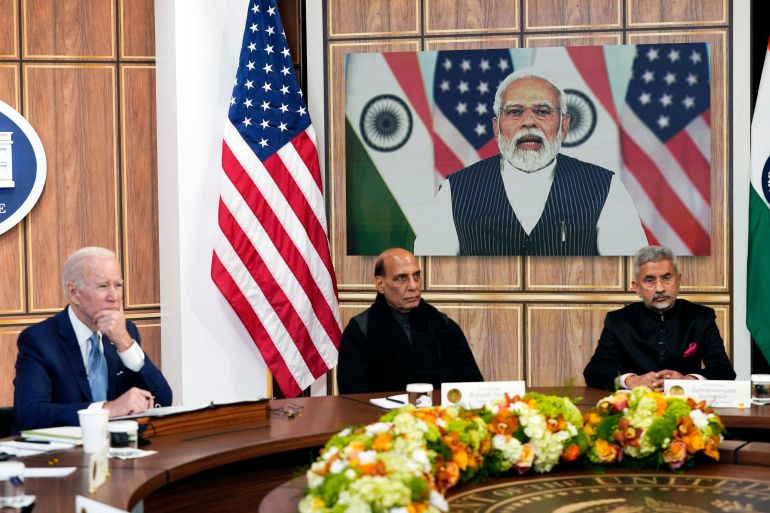Biden tells Modi more Russian oil imports not in India’s interest
Joe Biden told PM Narendra Modi that US can help India diversify oil supplies amid war in Ukraine, White House says.

United States President Joe Biden has held a “constructive, direct conversation” with Indian Prime Minister Narendra Modi, the White House said, as the US is seeking more help from India to apply economic pressure on Russia over its invasion of Ukraine.
In a news briefing on Monday afternoon, White House press secretary Jen Psaki said Biden told Modi that his administration could help India diversify its oil imports – but that it was not in New Delhi’s interests to increase energy imports from Moscow.
Keep reading
list of 3 itemsIndia-Russia explore a rupee-rouble payment scheme to bypass war
Russia is offering SWIFT alternative to India for rouble payments
The Biden administration already made it clear that it does not want to see a significant uptick in Russian energy imports by India, which has purchased at least 13 million barrels of discounted Russian crude since the country invaded Ukraine in late February.
“The president … conveyed that we are here to help them diversify their means of importing oil. The imports from the United States are already significant, much bigger than the imports that they get from Russia,” Psaki told reporters.
“The president conveyed very clearly that it is not in their interests to increase that.”
She did not say whether the US had received any commitments from India on energy imports.
Monday’s virtual talks, which preceded a “US-India 2+2 Ministerial” meeting, included US Secretary of State Antony Blinken, US Secretary of Defense Lloyd Austin, Indian Minister of External Affairs Subrahmanyam Jaishankar and Indian Minister of Defence Rajnath Singh.
The discussion came as New Delhi continues to try to balance its ties with Moscow and the West, which has imposed a series of sanctions against Russia over the Ukraine war and urged nations to move away from Russian energy supplies as a way to exert pressure on President Vladimir Putin.
Speaking through a translator on Monday ahead of his meeting with Biden, Modi said that he has suggested direct talks between Putin and Ukrainian President Volodymyr Zelenskyy.
“I spoke several times on the phone to the presidents of both Ukraine and Russia,” Modi said. “I not only appealed to them for peace, but also suggested President Putin to hold direct talks with the Ukrainian President.”
The situation in Ukraine is “worrying”, said Modi, who also condemned the killings in the Ukrainian city of Bucha, where the discovery of hundreds of civilian bodies following a Russian withdrawal from the town sparked international outrage, and called for an independent investigation.
For his part, Biden opened the talks with the Indian prime minister by emphasising the defence partnership between the two countries and saying the US and India are going to “continue our close consultation on how to manage the destabilising effects of this Russian war”.
“The root of our partnership is a deep connection between our people, ties of family, of friendship and of shared values,” the US president said.
But the war in Ukraine has been a source of tensions in recent weeks, with Biden previously saying that India was “somewhat shaky on Ukraine”.
India is a member of the so-called Quad grouping – which also includes the US, Japan and Australia and ostensibly serves as a regional bulwark against Chinese expansion – but has not imposed sanctions on Russia like other members.
Russia has long been India’s biggest supplier of defence equipment despite growing purchases from the US in the past decade.
India abstained when the United Nations General Assembly voted last week to suspend Russia from the 47-member Human Rights Council over allegations that Russian soldiers in Ukraine engaged in rights violations that Washington and Kyiv have called war crimes.
Lured by steep discounts following Western sanctions on Russian entities, India’s recent purchases of at least 13 million barrels of Russian crude oil mark a sharp uptick from last year; it imported some 16 million barrels for all of 2021, data compiled by the Reuters news agency shows.
The US Deputy National Security Adviser for International Economics Daleep Singh, who visited India recently, previously said the US will not set any “red line” for India on its energy imports from Russia but does not want to see a “rapid acceleration” in purchases.
At a news conference later on Monday, Jaishankar, India’s external affairs minister Subrahmanyam Jaishankar, pushed back against a question on India’s energy purchases from Russia, saying the focus should be on Europe, not India.
“Probably our total purchases for the month would be less than what Europe does in an afternoon,” he said.
During her earlier news conference, Psaki said the US has seen India speak out more forcefully against Russia’s invasion of Ukraine, particularly “as it relates to the horrific photos that we saw around Bucha“.
“We’ve seen them take steps to provide humanitarian assistance and a range of assistance, but it is something we always encourage leaders to do – to speak out, to be vocal, to ensure they are on the right side of history,” she said.
“But this was a constructive call, it was a productive call. It’s a relationship that is vitally important to the United States and to the president. I would not see it as an adversarial call.”
The two leaders had last spoken in March as part of a wider meeting of Quad leaders.
Meanwhile, Blinken, the US secretary of state, said he looked forward to discussing a range of issues with Indian officials during the “US-India 2+2 Ministerial” meeting on Monday afternoon, including efforts to end the COVID-19 pandemic and address the climate crisis.
“I’m also looking forward to talking about our security cooperation in the Indo-Pacific,” Blinken told reporters.